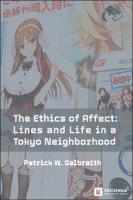The Ethics of Affect
Lines and Life in a Tokyo Neighborhood
Abstract
Based on ongoing fieldwork in the Akihabara neighborhood of Tokyo, specifically a targeted subproject from 2014 to 2015, this book explores how and to what effect lines are drawn by producers, players and critics of bishōjo games. Focusing on interactions with manga/anime-style characters, these adult computer games often feature explicit sex acts. Noting that the bishōjo, or “cute girl characters,” in these games can appear quite young, legal actions have been taken in a number of countries to categorize and prohibit the content as child abuse material. In response to the risk of manga/anime images encouraging underage sexualization, lawmakers are moved to regulate them in the same way as photographs or film; triggered by images, the line between fiction and reality is erased, or redrawn to collapse forms together. While Japanese politicians continue to debate a similar course, sustained engagement with bishōjo game producers, players and critics sheds light on alternative movement. Manga/anime-style characters trigger an affective response in interactions with their creators and users, who draw and negotiate lines between fiction and reality. Interacting with characters and one another, bishōjo gamers draw lines between what is fictional and what is “real,” even as the characters are real in their own right and relations with them are extended beyond games; some even see the characters as significant others and refer to them using intimate terms of commitment such as “my wife.” This book argues for understanding the everyday practice of insisting on lines, or drawing a line between humans and nonhumans and orienting oneself toward the drawn lines of the latter, as demonstrating an emergent form of ethics. Occurring individually and socially in both private and public spaces, the response to fictional characters not only discourages harming human beings, but also supports life in more-than-human worlds. For many in contemporary Japan and beyond, interactions and relations with fictional and real others are nothing short of lifelines.
Keywords
ethnography; adult computer games; Japanese popular culture; freedom of expression; ethicsDOI
10.16993/bbnISBN
9789176351567, 9789176351574, 9789176351581, 9789176351598, 9789176351567Publisher
Stockholm University PressPublisher website
https://www.stockholmuniversitypress.se/Publication date and place
Stockholm, 2021Imprint
Stockholm University PressSeries
Stockholm Studies in Media Arts Japan, 1Classification
Atlantic Ocean islands / Polar regions
Social and cultural anthropology
Cultural studies
Game theory
Gender studies: ‘trans’, transgender people and gender variance
Japanese
Popular culture
Sex and sexuality, social aspects
Ethical issues and debates
Anthropology


 Download
Download